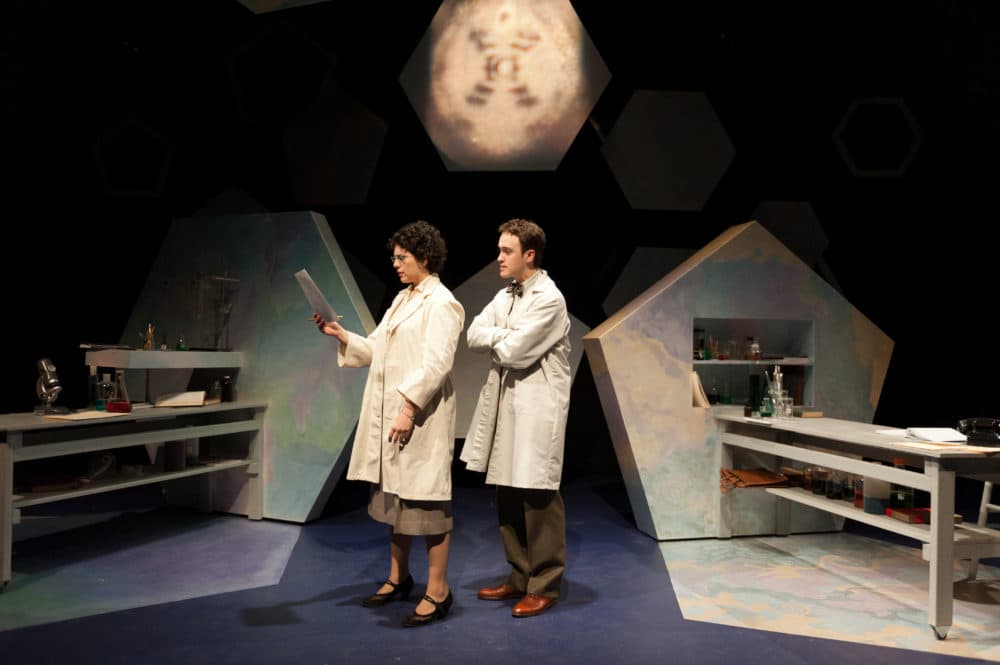Advertisement
With 'Photograph 51,' Central Square's Nora Theatre Wants To Show Women They Have A Voice

Back in 1952, British biophysicist Rosalind Franklin was using X-ray crystallography to study DNA at Kings College in London. Franklin and Maurice Wilkins were meant to work together, but some misunderstandings made it hard for them to find their footing as a team.
That led to Franklin mostly working in solitude; Wilkins connected with Francis Crick and James Watson, who were theorizing about the structure of a DNA molecule model at the Cavendish Laboratory in Cambridge. Without Franklin’s knowledge, Wilkins shared her unpublished work with Crick and Watson, including the groundbreaking “Photo 51” that captured DNA’s double-helix structure. The three men created a model using Franklin’s photo, and a decade later, they received Nobel Prizes for the discovery.
Stories like this are all too familiar. The Nora Theatre Company, based at Central Square Theater in Cambridge, chose to produce a play based on that true story — titled "Photograph 51” — this season as our world grapples with #MeToo and gender inequity with greater intensity.

Lee Mikeska Gardner, artistic director at The Nora, said the show “tackles a lot of the elements of the #MeToo movement,” and that it was picked to mark the 30th anniversary of The Nora, the 40th anniversary of sister theater company, Underground Railway and the 10th anniversary of Central Square Theater because, “it resonates in such a different way today,” than when it was first staged there in 2012.
Franklin faced working in “a very white male environment,” Gardner said, where her colleagues were “operating under both unconscious and conscious bias.” Her coworkers talked about her looks, her temperament and they commented on “Franklin’s assumption that she should be treated with the same equality,” as other scientists in the lab Gardner shared.
In this play, no matter what happens, Franklin (played by Stacy Fischer), “isn't anyone but herself,” Gardner said. “She is prickly and she's abrasive and she talks about [being] a perfectionist.”
The story explores gender bias, harassment and anti-Semitism, but one of the bright spots is Don Caspar (played by Jesse Hinson), who accepts Franklin for who she is, Gardner shared. Caspar "respects her as a scientist" and "doesn't patronize her," Gardner offered. “That’s my aspiration. Those are the kinds of people we want in our lives, and those are kinds of people we want to be to the people in our lives.”
Advertisement
It’s been more than 60 years since Franklin’s discovery, but sexism in science still exists. The National Academies of Sciences, Engineering, and Medicine’s 2018 study found more than 50 percent of women faculty and staff experience sexual harassment in academia. And McKinsey & Company’s 2018 study reported that women across industries are underrepresented at every level and cited gender bias, harassment and discrimination as a few of the reasons.

Rebecca Bradshaw, director of “Photograph 51,” has encountered gender bias during her career and talked about getting second-guessed at work or her friendliness being mistaken for romantic interest. She hopes that this play helps people “see the subtleties in sexism, and how detrimental those subtleties are,” she offered.
When preparing for the play, Bradshaw read a lot about Franklin’s life, had conversations with friends in scientific fields and conducted additional research. She learned that despite the collaborative nature of the work, the leadership structure allows “the person running the lab to walk away with the credit,” she said.
Bradshaw’s producing and directing work centers around her “curiosity in people and the choices they make,” so that moment or that choice, when “the we becomes I,” in the collaborative setting, she explained, sparks intrigue.
Stories that highlight feminine perspectives are at the core of The Nora’s mission. When curating a season, Gardner — a long-time thespian and former managing director of the Washington Shakespeare Company (now WSC Avant Bard) — thinks about the kinds of stories we need to hear, stories we haven’t heard and what we need to hear again, she said.
Both Gardner and Bradshaw have experience either acting or directing such stories. Last year, Gardner starred as Olympe de Gouges — a French writer and activist who tackled various social issues and wrote a pamphlet declaring the rights of women — in The Nora’s production of “The Revolutionists.” Bradshaw directed Charles Mee’s “Big Love,” at Brandeis University, in which brides resisted forced marriages and “FuFu & Oreos,” a one-woman play written by Massachusetts native Obehi Janice, centered on navigating her Nigerian-American identity.
Female characters fighting against societal norms pepper both of their resumes and “Photograph 51” isn’t any different. Challenges like those Franklin battled, Bradshaw said, can diminish a person’s self-worth and talents and keep those affected from standing up the next time. With this play she intends to show people that we all have a voice regardless of gender.
“Photograph 51” is at Central Square Theater in Cambridge from March 14 through April 14. The play is a Catalyst Collaborative@MIT Production and is part of The Brit d’Arbeloff Women in Science Production Series.
